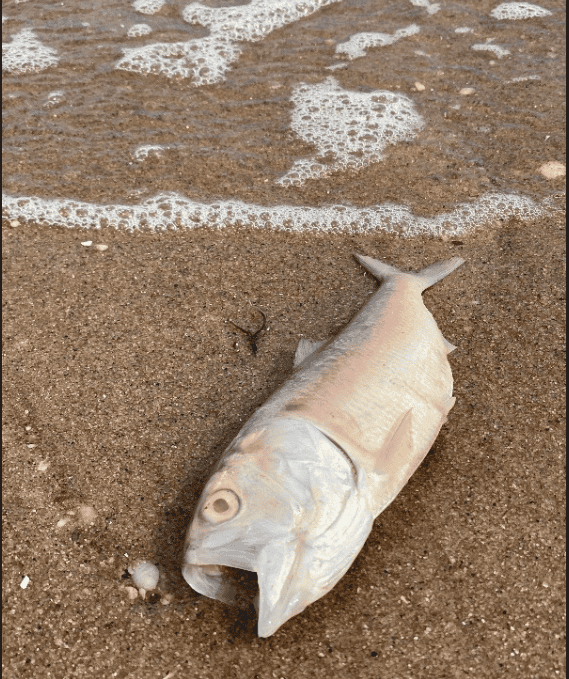Save Coastal Wildlife is receiving reports of many dead fish found on the beach from South Amboy eastward to Port Monmouth in Middletown.
According to information provided by the non-profit organization, members who visited the area on Sept. 4 and 5 discovered:
- Most of the dead fish were Atlantic menhaden or bunker (Brevoortia tyrannus), though there were also some dead summer flounder and juvenile bluefish seen scattered along the edge of the bay.
- Live menhaden swimming near the beach were observed acting erratically. They were often seen swimming alone, in circles and sideways, and jumping occasionally out of the water.
- Dead menhaden were seen with a pink-red glaze on their skin.
- Quite a few menhaden appeared to have been dead for at least a week, many days before the remnants of Tropical Storm Ida arrived on Sept. 1. The fish were in a bad state of decomposition.
- The only species that seemed to be eating the dead menhaden were killifish or mummichogs. They didn’t see many gulls eating menhaden, even though dead fish were all over.
- A plume of dirty brown water was observed throughout Raritan Bay and the western edge of Sandy Hook Bay. Most likely this plume of dark water was polluted runoff or stormwater from the intense and extreme rainfall.
According to the New Jersey Department of Environmental Protection’s Fish & Wildlife Division (DEP), the menhaden are dying due to an influx of freshwater into the estuary from the intense rainfall that occurred on Sept. 1 and 2, according to the statement.
However, the group stated it has never heard of fish dying in the lower reaches of an estuary from an influx of freshwater, and said more research needed to be done by DEP. They claimed menhaden fish have been dying along the northern Jersey Shore for the past year-and-a-half, according to the statement.
If a large amount of dead fish is observed, it should be reported immediately to the DEP Hotline at 1-877-WARN-DEP (1-877-927-6337).
In order to successfully determine the cause of a fish kill it is important to arrive during the early stages, when freshly dead or dying fish are available for examination, according to the statement.
Fish kills can be related to a number of causes including infectious diseases, toxic substances, or poor environmental conditions, according to the statement.

